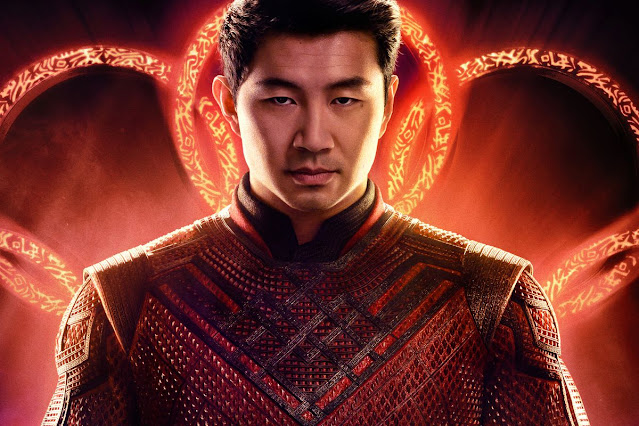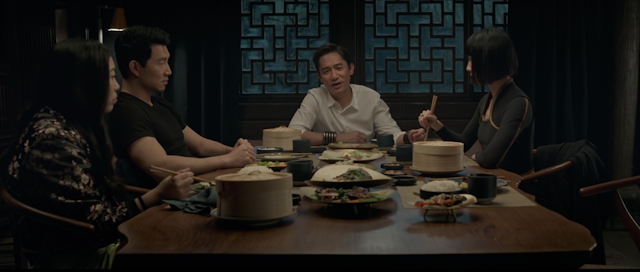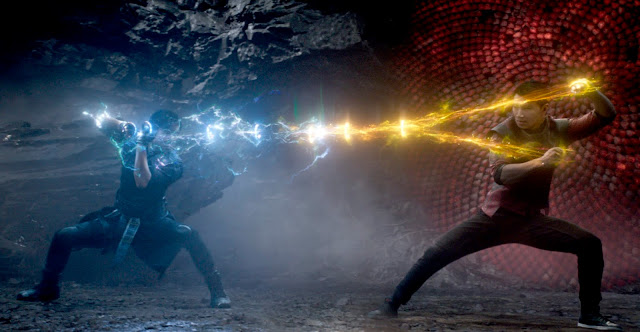Fan Retrospectives: 'Shang-Chi' and Identity
Review by Eric Lee
Also, MAJOR spoilers follow for anyone who hasn't seen the movie!
 |
| Shang-Chi is an Asian American movie |
Despite the film having a lot of dialogue spoken in Mandarin, it's a distinctly Asian American movie, with an Asian American perspective. The director, Destin Daniel Cretton, is an Asian American. The film's two main stars: Simu Liu and Akwafina are both Asian American. Yes, I know Liu is actually Canadian, but the term encompasses all of North America.
My in-laws
are not Asian American. They've lived in China for much of their lives
and hold a very traditional Chinese belief system. On the other
hand, I'm a 2nd generation Asian American. My grandparents were the
ones who immigrated to the Bay Area, not my parents. So I'm two
generations removed from my Chinese roots. I don't follow most Chinese
customs. I don't speak any of the languages, and I don't even remember my own
Chinese name.
That's why the two scenes that
resonated with me the most in "Shang-Chi" were when the characters were
conversing around mealtimes.
The first dining
scene is at the beginning of the film where we see Shang-Chi (Liu) and
his friend Katy (Akwafina) eating breakfast with her family in their San
Francisco apartment.
Katy suggests that her
grandmother "move on" from her grandfather's death. Katy's mother
quickly retorts with a subtly-exasperated face, "Moving on is an
American idea".
That hit me. You can
tell that similar conversations about the two cultures have been repeated
over and over again in their household. Katy's grandmother, and possibly
mother, came from China and hold those traditional beliefs very tightly.
Whereas Katy and her brother are steeped in American culture. While
ultimately Katy's mother relents and drops the subject, the
disappointment still lingers.
This is not
unlike the conversations that plagued me as a child when I visited my
grandparents' home. Just like the family in the movie, they too also
repeatedly expressed disappointment at my disinterest in being more
"Chinese" and, just like Katy's mother, they ultimately ended up dropping the
subject.
Contrast that with another similar -
but strikingly different - meal scene that occurs about halfway through the
movie. Shang-Chi, his sister Xialing, and Katy have a
traditional Chinese dinner with Shang-Chi's father, and the main villain Wen Wu, played by Tony Leung.
 |
| Wen Wu (center) confronts Katy (left) about her cultural identity |
"Names are sacred [sic], they connect us not only to ourselves but to everybody who comes before."
Oof. As someone who doesn't remember my own Chinese name, that line was a real gut-punch.
While
he's ultimately villainous, Wen Wu is not wrong on the importance of
knowing all of your cultural heritage. It's a part of you and it's a
little sadder when that piece is not acknowledged. While this isn't a
new revelation for me, "Shang-Chi" certainly crystallized.
This
idea of locking away parts of your identity is also embodied in the hero's personal character arc. While he doesn't necessarily
struggle to synthesize his Chinese side with his American side, he does
struggle to accept that he's both his father and mother's child.
The movie's thesis about identity, whether it'd be cultural or otherwise, is emphasized by Michelle Yeoh's Ying Nan:
"You
are a product of all who came before you. The legacy of your family,
the good and the bad. It is all a part of who you are."
Identity
is only fully realized once you acknowledge and accept your entire background. It's a powerful statement for Asian cultures who heavily
emphasize respecting elders and the past, but also to Asian Americans, like me, who are caught between two wildly different belief systems.
The movie does a wonderful job of illustrating that conflict. There's a very literal scene where Shang-Chi is in a tug of war with his father with the titular power rings. One side is blue, representing Wen Wu's cold and uncaring demeanor. The other side is warmer red, representing Shang-Chi's mother's more nurturing influence.
 |
| Wen Wu and Shang-Chi's battle represents the pull that many Asian Americans experience, where they feel caught between two identities. |
Back to my in-laws. After the movie ended, my father-in-law briefly
said "Good" and left the room. I don't really know if he has any other
thoughts about the movie beyond that. I can't communicate with him well,
since he primarily speaks Chinese and Spanish (which is a different
story for another time).






Comments
Post a Comment